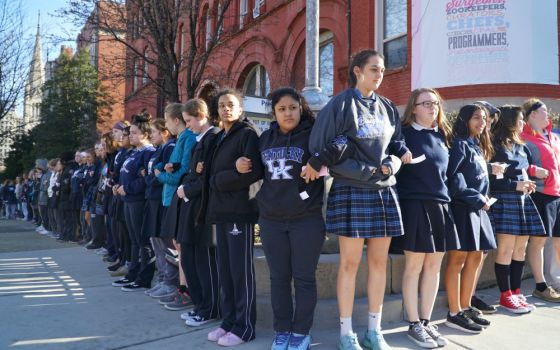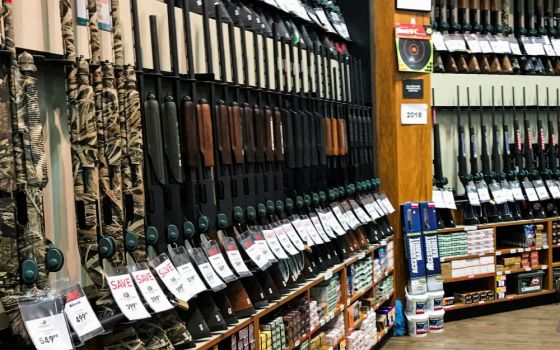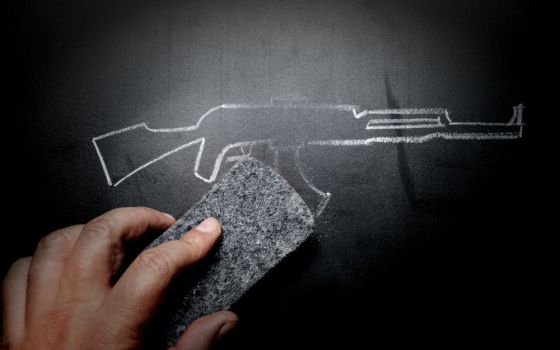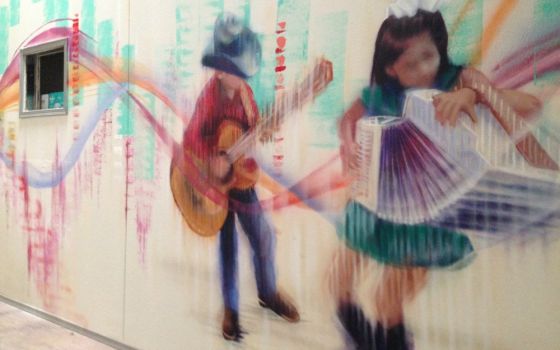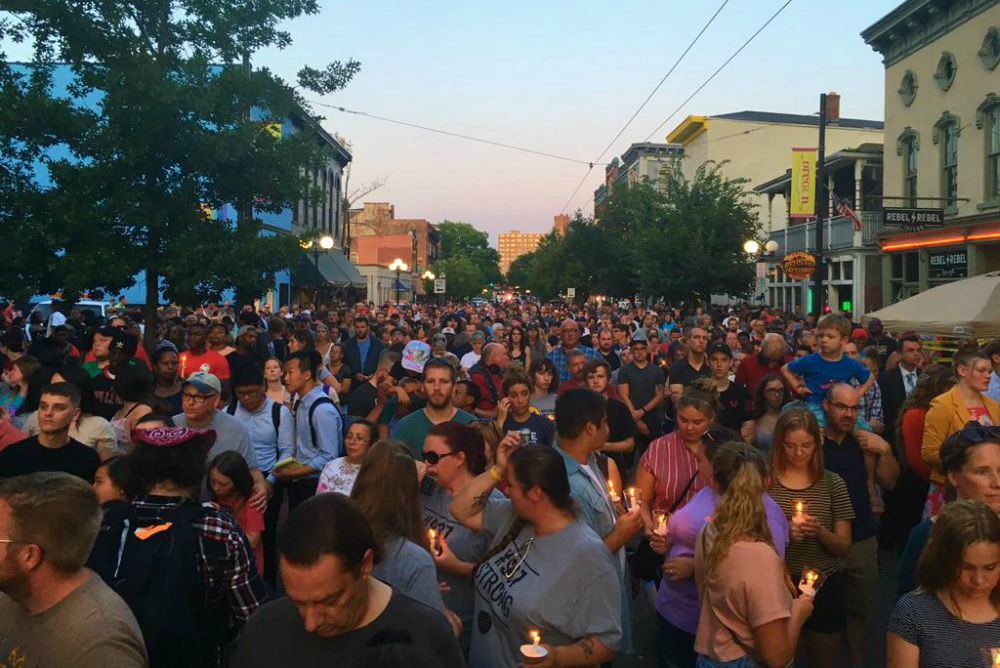
People gather in Dayton, Ohio, Aug. 4 after a gunman killed nine people at a nightclub in the early morning. (Courtesy of Satish Joseph)
Nick Cardilino thought he understood solidarity and the human family. Then he woke up to the news Sunday morning of the mass shooting at a bar in Dayton's Oregon District and remembered that his son had been a few blocks away, at a baseball game, the night before.
"As you can imagine, I panicked," said Cardilino, who serves as associate director of campus ministry and director of the Center for Social Concern at the University of Dayton. He texted his son right away and thought, "If he doesn't reply to me in five minutes, I'm going to call him and wake him up."
His son texted right back, to Cardilino's great relief, but an hour later, he found himself sobbing. He was now in solidarity with his brothers and sisters in a litany of U.S. communities impacted by mass shootings, including El Paso, Texas, not 24 hours earlier. "I wish I had gone there first," he said of his immediately thinking not of other communities, but first of his own kids, then his students and his community. "I found myself kind of moving out from my own personal situation," he said.
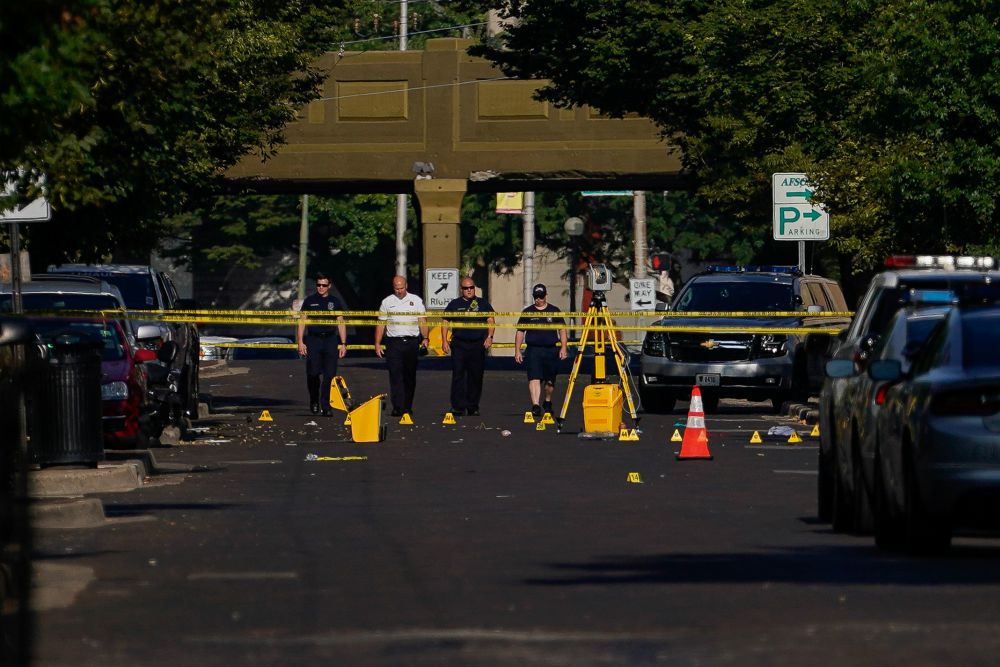
Officials investigate the scene after a mass shooting in Dayton, Ohio, Aug. 4. (CNS/Reuters/Carlos Sanchez)
The struggle to react
Cardilino added the experience put him in touch with how desensitized he's become to the endless news of mass shootings.
"The longer it goes on, the more I've become desensitized, and so I was kind of shocked in some ways at how personal this became, because it happened in my backyard," he said. The physical distance of other affected communities, he noted, "enables us to be not only physically distant but also somehow psychologically distant. And when it keeps happening over and over again, it makes us even more distant."
Sara Seligmann, regional director for the Catholic Social Action Office of the Cincinnati Archdiocese, based in Dayton, said people have told her they're surprised by how numb they feel, again largely due to the frequent nature of mass shootings. She observed that other bad news in Dayton in recent months, such as a Klu Klux Klan rally and devastating tornadoes, have left the city "feeling beaten down."
While these struggles have fostered a sense of deeper unity in the city, she added, "This might be less unifying than the other instances just because of partisan politics and the things people might do and say in terms of what the right reaction is to gun violence."
Reactions by U.S. bishops included Cincinnati Archbishop Dennis Schnurr calling the shootings in El Paso and Dayton "tragic and violent," and Chicago Cardinal Blase Cupich issuing a statement that noted, "We cannot tolerate a society in which parents have to wonder whether the child they dropped off in the morning will become another statistic or if their own lives will end that day in their place of work. Mass shootings are not an inevitability."
Political solutions
Pushing back against a sense of inevitability was a strong sentiment for both Cardilino and Seligmann.
"You need to comfort the community," Seligmann said, "but recognize this is no longer a freak thing. This keeps happening, and we need to figure out how to make it stop happening and treat it like the life issue that it is, because people keep getting killed."
Seligmann noted that her own pastor, Fr. Satish Joseph of Immaculate Conception parish in Dayton, held a prayer service for those killed in the shooting — including the perpetrator — in place of his homily and said that she agreed with the priest's activist approach.
Advertisement
Joseph said via email, "Faith responses must be backed up with action for change. I personally called for reform on gun laws and asked people to write to their reps. … I am amazed at America's love affair with guns. Perhaps, now we realize that this love affair has gone too far." Joseph, a native of India, added, "If the gun lobby has the power it has over the legislature, then what is the power of her democracy? Is America a democracy or an oligarchy?"
Cardilino agreed about the need for action and said that, watching former Ohio Gov. John Kasich on television, he found his own anger reflected in Kasich's words: that nobody talks about policy fixes in the aftermath of a shooting, only to let the issue fade as politicians quietly continue to take money from the gun lobby. The end result, Cardilino noted, is a reality that is "not going to change unless people are marching in the streets."
People in the streets
Precious Blood Sr. Jeanette Buehler has been part of an effort to lead prayer vigils marking homicides in the city of Dayton for over the past decade, a practice that has seen nearly 530 deaths commemorated. Buehler participated in a larger vigil, put on by the city, Sunday night, at which Ohio Gov. Mike DeWine spoke and the crowd responded with a chant of "Do something."
"I think we kind of hate to say it's a political issue, but there are definitely political implications here. I keep wondering what is going to be the final tipping point that's going to say to us, as people, this really is enough and we are going to do something, and we're going to insist that our Congress does something," Buehler said. "We can keep talking among ourselves. We can keep holding prayer vigils, and we have to trust that the work of God is going to be brought to completion. But at the same time, we do have to do something ourselves."
Buehler cited the importance of stepping out of one's comfort zone and building relationships with people who are strangers. She cited Dayton's segregated nature and people returning to their own communities at the end of the day as obstacles.
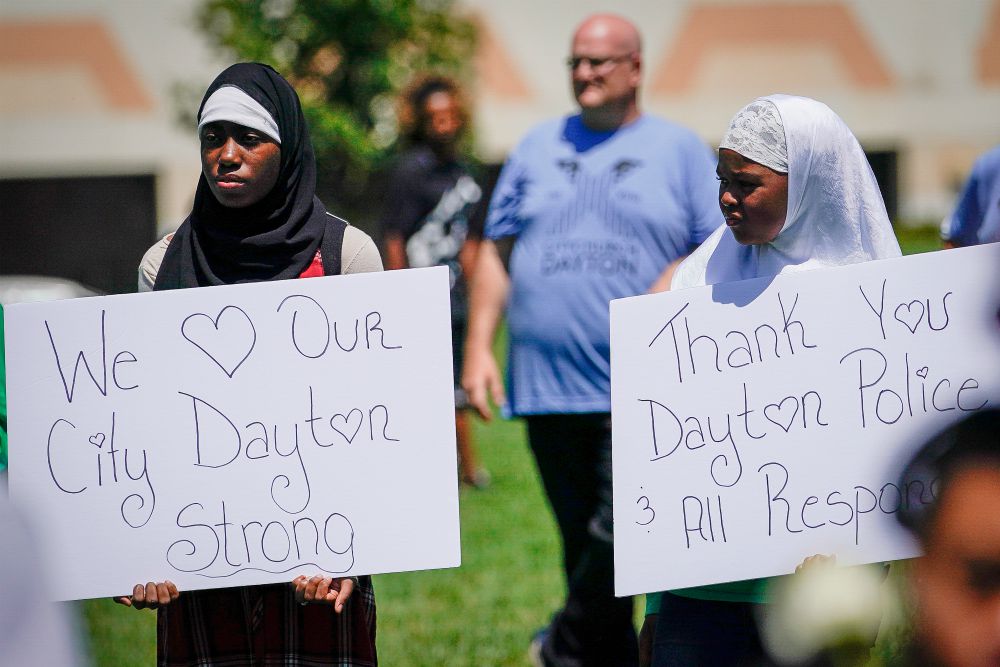
People take part in a vigil in Dayton, Ohio, Aug. 4. (CNS/Reuters/Carlos Sanchez)
"I think it's something we want to do something about, but it's so much easier to come together when something terrible happens," she noted.
Cardilino hopes his students take up the push for common-sense gun laws — including greater care and funding for people with mental illnesses — when they return for the semester, provided that the issue hasn't faded by the start of the academic year.
"Our students are constantly surprising me with their compassion and with their ingenuity and creating new things," he said.
Seligmann of the archdiocese sees political action as a natural and necessary part of a Catholic response to tragedy.
"We have got to stop this. We have got to vote for people to stop this, and we have got to lobby people," she said. "You can't be authentically pastoral if you're not trying to stop the problem."
[Don Clemmer is a journalist, communications professional and former staffer of the U.S. Conference of Catholic Bishops. He writes from Indiana. Follow him on Twitter: @clemmer_don.]




